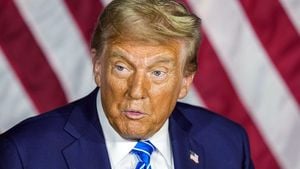Former President Donald Trump has set the stage for significant changes to U.S. public health policy should he secure another term, actively involving Robert F. Kennedy Jr. (RFK Jr.) as a prominent health policy advisor. During recent campaign events, Trump expressed his intent to let Kennedy go "wild" on health policies, hinting at drastic shifts, particularly concerning the mental and physical well-being of Americans.
At Madison Square Garden on October 27, Trump made headlines by stating, "I'm going to let him go wild on health. I'm going to let him go wild on the food. I'm going to let him go wild on the medicines." This declaration signals his inclination to delegate the responsibility of overseeing health sciences and public health regulations to Kennedy, who has gained notoriety for his controversial views, particularly on vaccines and public health interventions.
Reflecting Kennedy's ambitions, he has articulated the need for major reforms within prominent health agencies such as the U.S. Food and Drug Administration, the National Institutes of Health, and the CDC. According to Kennedy, Trump has asked for his help to dismantle the perceived corrupt influences within these organizations. "He wants to look at the vaccines. He wants everything," Trump elaborated when discussing Kennedy's potential role.
This development is particularly consequential considering Kennedy's history of promoting debunked theories and dubious claims linking vaccines to autism and advocating for the elimination of fluoride from drinking water. His remarks about fluoride have stirred controversy; Kennedy has called for removing the compound from public water systems, attributing it to various health woes, which contradicts longstanding endorsements from major health organizations. For example, the CDC has hailed fluoridation as one of the top public health achievements, emphasizing its role in reducing tooth decay significantly.
After officially endorsing Trump and making appearances on the presidential campaign trail, Kennedy has maintained his controversial stance, which includes skepticism toward established medical practices. He claimed, "On January 20, the Trump White House will advise all U.S. water systems to remove fluoride from public water, associat[ing] fluoride with industrial waste and numerous health issues," showcasing his radical approach to public health.
This is not just rhetoric; Donald Trump’s administration's embrace of Kennedy raises concerns among health experts and advocates about the potential for public health policies to shift drastically under his influence. Despite Kennedy lacking formal scientific training, he has positioned himself as capable of reforming health policies, thereby potentially reshaping the integral agencies responsible for safeguarding public health.
Critics are alarmed by the prospect of Kennedy influencing federal health policy. Many medical professionals point to the overwhelming consensus among scientific bodies, including the American Dental Association and the CDC, supporting the safety and efficacy of fluoride. These agencies argue against Kennedy's claims, emphasizing the necessity of fluoridation to combat dental cavities and its benefits for public health. Merging personal beliefs with influential health policy could trigger severe ramifications for American health practices.
The recent legal ruling favoring anti-fluoride activists has added tension to the debate surrounding this issue. A California judge ordered the EPA to reevaluate its regulations on fluoride levels, citing potential risks to children's health—a development noted by the Fluoride Action Network. This ruling has enabled communities nationwide to reconsider their fluoridation practices, raising questions about how far this could extend under increased advocacy from individuals like Kennedy.
Reverting established public health norms could not only affect dental health but also broader health policies as well. RFK Jr.'s historical skepticism toward various public health measures raises alarms. Trump’s willingness to bring Kennedy to the forefront of public health administration complicates the nuance of legitimate health discourse with conspiracy-laden controversies.
Articulated at his campaign events, Trump has suggested: “Bobby is going to be working on the food and the pesticides and all of the things [in health].” He contemplates allowing Kennedy to lead changes across the food safety regulations, environmental health measures, and health sciences, cementing Kennedy’s role as central to health policy reform should Trump reoccupy the Oval Office.
Kennedy's acceptance as Trump’s health czar is steeped not only in personal ideology but also political strategy, as the former’s anti-establishment rhetoric resonates with segments of Trump’s base. His focus on "making America healthy again" transforms political campaigning from mere promises to outright revolutionary aspirations.
Should Kennedy join the Trump administration, the debate over public health's direction will intensify. With well-established health practices being marked for scrutiny and potential reversal, the balance between public health benefits and political populism hangs precariously. The consequences of this shifting tide could reshape American politics, the operations of notable health organizations, and the public’s health outcomes.
The 2024 election promises more than just the typical debates on the economy or foreign policy; it poses fundamental questions about public health trust and the integrity of information guiding health policy. The stakes are especially high as personal beliefs about medical authority clash with scientific consensus. Keeping the public informed and protected requires careful navigation through complex political ideologies united with credible health science—an endeavor soon to be tested, considering the current political momentum.
With Trump emphasizing Kennedy's significant role, the upcoming election might reflect more than just electoral outcomes; it could signify the culmination of divergent public health philosophies. The question remains: Are Americans ready to place the fate of their health policy under the influence of someone so closely associated with conspiracy theories and unproven claims? Only time will tell as the election buzz intensifies around these controversial health narratives.



